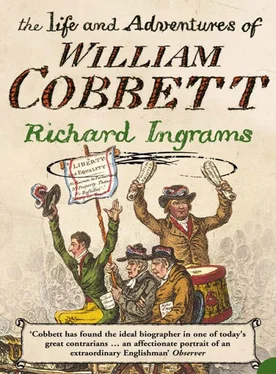Central to Cobbett’s argument was a denial of Priestley’s claim to be seeking asylum in America from the allegedly repressive and tyrannical authorities in Britain. Priestley had been an enthusiast for the French Revolution, unwavering in the face of the Jacobin excesses that had horrified public opinion in his native country. Middle-class Dissenters who had welcomed the Revolution’s campaign for religious tolerance and equality had formed debating clubs and societies throughout England to propagate French ideas and send messages of support to the revolutionaries. In Priestley’s home town of Birmingham, as in many other cities, a dinner had been organised to commemorate the second anniversary of the storming of the Bastille, an event that sparked off a major riot lasting for four days. During the disturbance Priestley’s house and library were burnt to the ground, to the gratification of many, including King George III. Priestley fled to London and three years later emigrated to America to join his sons, already resident there.
In Cobbett’s eyes Priestley’s hypocrisy lay in seeking ‘asylum’ from a supposedly tyrannical system which he claimed had denied him protection or redress. In fact, following the Birmingham riot, eleven of its ringleaders were indicted, of whom four were found guilty and two executed. In the meantime Priestley sued the Birmingham city council and was awarded damages of £2502.18 s . to compensate for the loss of his property:
If he had been the very best subject in England in place of one of the very worst, what could the law have done more for him? Nothing certainly can be stronger proof of the independence of the courts of justice, and of the impartial execution of the laws of England than the circumstances and result of this case. A man who had for many years been the avowed and open enemy of the government and constitution, had his property destroyed by a mob, who declared themselves the friends of both, and who rose on him because he was not. This mob were pursued by the government whose cause they thought they were defending: some of them suffered death, and the inhabitants of the place where they assembled were obliged to indemnify the man whose property they had destroyed. It would be curious to know what sort of protection this reverend Doctor, this ‘friend of humanity’ wanted. Would nothing satisfy him but the blood of the whole mob? Did he wish to see the town of Birmingham, like that of Lyons, razed and all its industries and inhabitants butchered; because some of them had been carried to commit unlawful excesses from their detestation of his wicked projects? BIRMINGHAM HAS COMBATTED AGAINST PRIESTLEY, BIRMINGHAM IS NO MORE.
Such an extract is enough to show Cobbett’s clear, strong invective – his meaning immediately clear, his mastery of the language absolute. En passant he could not avoid indicting Priestley, not only for his political and religious failings, but for writing bad English: ‘His style is uncouth and superlatively diffuse. Always involved in minutiae, every sentence is a string of parentheses in finding the end of which, the reader is lucky if he does not lose the proposition that they were meant to illustrate. In short, the whole of his phraseology is entirely disgusting; to which may be added, that, even in point of grammar, he is very often incorrect.’
Cobbett’s energies however were in the main directed, not just in the Priestley pamphlet but in all his American writings, to attacking the Democrat party, and particularly, during his first years, to supporting the treaty with Britain that Washington, along with his Chief Justice John Jay, was desperately trying to get the Senate to ratify. The British government, now at war with revolutionary France, was naturally keen to stop America allying itself with the enemy. But such were the strong pro-French feelings among the Democrat politicians and the Philadelphians that it was proving a difficult task. A hysterical enthusiasm for France and the French Revolution was then the dominant political passion in the United States, and especially in Philadelphia. France had assisted America with troops and money during the War of Independence, and many Americans felt that their own revolution had inspired the French. None of the excesses of the French Jacobins could dampen the enthusiasm. Street names which included the words ‘King’, ‘Queen’ or ‘Prince’ were changed, democratic societies were formed, and men cut their hair in the ‘Brutus crop’.
Cobbett noted how some Americans even adopted the French habit of referring to one another as ‘Citizen’ and wore tricolour cockades. ‘The delirium seized even the women and children. I have heard more than one young woman, under the age of twenty, declare that they would willingly have dipped their hands in the blood of the Queen of France.’
As the birthplace of American independence, Philadelphia was one of the main centres of revolutionary pro-French frenzy. Following the execution in January 1793 of Louis XVI (formerly the ally of America), a celebratory dinner was held in the city at which a pig was decapitated and the head carried round for all the diners to mutilate with their knives. When France declared war on England the following month the French Ambassador to the United States, Edmond Genet, sent to win over America to the French cause, was given an ecstatic welcome by the Philadelphians. He had been preceded by the French frigate Ambuscade which sailed up the Delaware and anchored off the Market Street wharf flying a flag with the legend ‘Enemies of equality, reform or tremble!’. When Genet himself arrived two weeks later the citizens went wild with excitement. John Adams recalled: ‘Ten thousand men were in the streets of Philadelphia day after day, threatening to drag Washington out of his house and effect a revolution in the government, or compel it to declare in favour of the French, and against England.’ At a dinner given at Oeller’s Hotel toasts were drunk to ‘Liberty’ and ‘Equality’, a special ode recited and the Marseillaise sung – with everyone joining in the chorus (‘I leave the reader to guess,’ wrote Cobbett, ‘at the harmony of this chorus, bellowed forth from the drunken lungs of about a hundred fellows of a dozen different nations’).
The bulk of Cobbett’s early journalism was concerned with combating such hysteria. In gruesome and gory detail he catalogued all the excesses of the Jacobins in France, poured scorn on their supporters such as Thomas Paine and, generally speaking, commended those Americans, like Washington, who advocated neutrality in the dispute between France and England. In ‘A Bone to Gnaw for the Democrats’ (1795), published under his pseudonym ‘Peter Porcupine’, he savaged those American republicans who were currently predicting an English revolution. The following year he published a much longer pamphlet with a much longer, if self-explanatory, title: ‘The Bloody Buoy, Thrown Out as a Warning to the Political Pilots of America: or a Faithful Relation of a Multitude of Acts of Horrid Barbarity, Such as the Eye Never Witnessed, the Tongue Never Expressed, or the Imagination Conceived, Until the Commencement of the French Revolution, to Which is Added an Instructive Essay, Tracing These Dreadful Effects to Their Real Causes’. Although they went against the general mood, these pamphlets enjoyed an immediate success. Three editions of ‘A Bone to Gnaw’ were published in less than three months, and Cobbett’s other pamphlets were constantly reprinted in both England and America.
In the meantime, Cobbett had become a father again, and this time the child was destined to live. A daughter, Anne, was born on 11 July 1795, at a time of great heat in the city. His wife Nancy, who was having trouble breastfeeding, was also unable to sleep because of the incessant barking of the Philadelphia dogs:
Читать дальше











